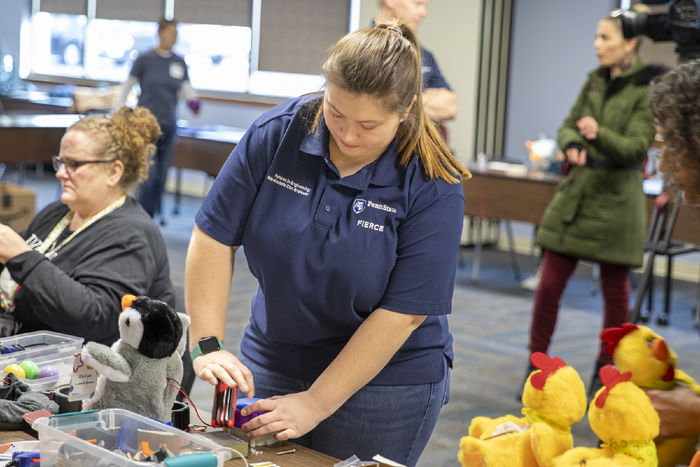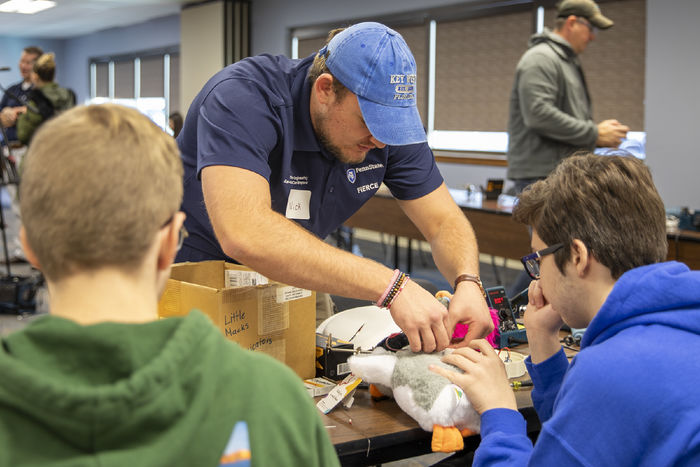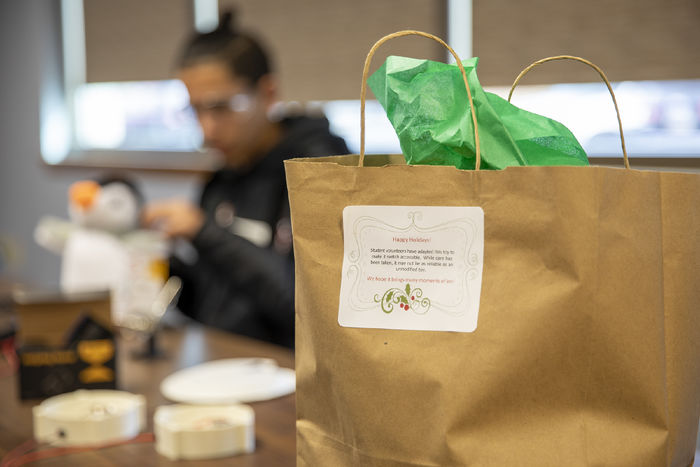
Kira Corrie, a first-year student in Penn State Berks' Electro-Mechanical Engineering Technology program, helps a high schooler with the the soldering process.
WYOMISSING, Pa. — In a unique collaboration this fall, Penn State Berks engineering students in the college’s Futures in Engineering: Role-models Can Empower (FiERCE) student organization worked with the Berks County Intermediate Unit (BCIU) and area high school students to adapt toys to be more accessible for local special needs children.
Engineering for Inclusivity
Penn State Berks engineering students who are members of FiERCE, a student organization in which engineering students mentor middle- and high-school students, met with high school students to examine the toys they planned to adapt. The students worked with three button-activated toys: a singing chicken that lays eggs, a penguin that lights up and a drumming "Animal," the Muppet character.
The group deconstructed and analyzed the toys and their functionality, then brainstormed ways to make them more accessible to children who are unable to use their fine motor skills to squeeze the button that activates the toy. The high school students suggested solutions, with Penn State Berks students guiding the design and execution.
To make the toys more accessible, high school students reverse-engineered the electronics embedded in the toy. They developed a second parallel operating control outside of the toy that could be activated via a much larger button that was easier for children to operate with minimal effort.
After the high school and FIERCE students established the design criteria, Penn State Berks students created 3D-printed prototypes of the new button design. Based on the prototypes, molds were created to mass produce parts while others were 3D printed at the Berks LaunchBox, an innovation hub of Penn State Berks located in the GoggleWorks Center for the Arts in downtown Reading.
“At Penn State Berks, we are really focused on creating a community where DEIB practices are integrated into our programs," said Marietta Scanlon, associate teaching professor of engineering, chair of the electro-mechanical engineering technology (EMET) program and faculty adviser for FiERCE. "This project is a great example of putting those ideas into action. It allowed us to extend the idea of the importance of inclusivity and empathy in engineering to not only our students, but to the next generation of students.”
High school students wired the new buttons to the toys with guidance from the FiERCE students.
“My favorite part of this project has been interacting with the kids,” said Kira Corrie, a first-year EMET major. “It’s been great to mentor them and help fully actualize their ideas and concepts through the entire process.”
Chuck Stricker, assistant teaching professor of engineering at Penn State Berks, explained that the students had two previous sessions dealing with component design, part testing and small-scale manufacturing leading up to assembly day.
Giving back to the community
Once these toys are completed, they will be gifted to special needs students throughout Berks County. The team has made dozens of toys more accessible and will be distributing the first batch to students in the Antietam School District, which had catastrophic flooding over the summer. Other toys will be gifted to BCIU students, as well as to students at Twin Valley and Governor Mifflin, the pilot schools for this project. These schools were selected because they had established STEM programs that were already working with BCIU.
Penn State Berks students and faculty stressed the both the mentoring and service aspects of the project.
“Our students are breaking down an intimidating topic and helping these kids feel more comfortable with it,” Scanlon said. “They’re not doing the work for them but allowing them to build their experience.”
Lucas Hall, a third-year mechanical engineering student, agreed.
“We’re helping these high schoolers build their STEM skill sets,” Hall said. “I’ve really enjoyed watching them tackle this project from start to finish."
Other students, such as third-year EMET major Nick Hill, said he explicitly sought out ways to support the community through coursework.
“Dr. Scanlon mentioned the FiERCE program to me when I had her for first-year seminar, and I thought it would be a great way to for me to give back to the community,” he said.
Working with the BCIU
This project was initiated by Katie Kehm, a program administrator at the BCIU, who was introduced to the idea when visiting the Carbon Lehigh Intermediate Unit.
“I had seen these students adapting tools for special needs students and I loved the idea,” Kehm said. “I have a science background, so I brought in some colleagues with special education backgrounds to see what we could do.”
Colleen Rios, educational consultant for BCIU and colleague of Kehm, had worked previously with Stricker. Together, they created a team with representatives from Penn State Berks and the BCIU to brighten special needs students’ holidays.
The BCIU students also played an important role in this project, the advisers said. While Penn State Berks students oversaw the high school students’ soldering and assembly work, BCIU students assisted with the testing, sewing, bagging and tagging of the toys to prepare them for distribution.
Penn State Berks offers baccalaureate degrees in electro-mechanical engineering technology and mechanical engineering. To learn more about the FiERCE student organization, contact Scanlon at mrs35@psu.edu.
Dr. Marietta Scanlon
Dr. Marietta Scanlon, Lecturer of Engineering and Director of the Penn State Homework Hotline at Penn State Berks








